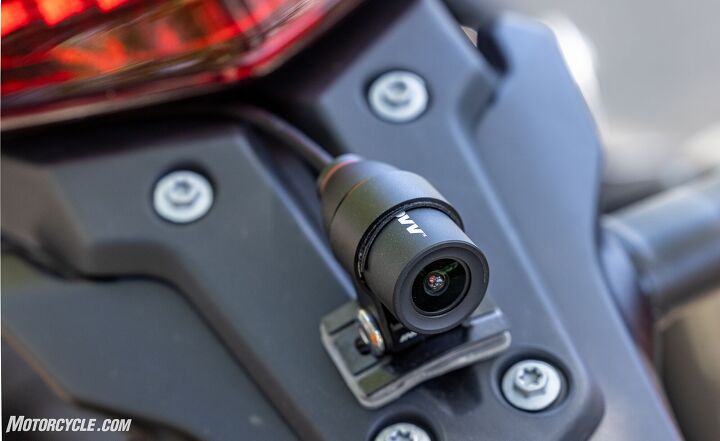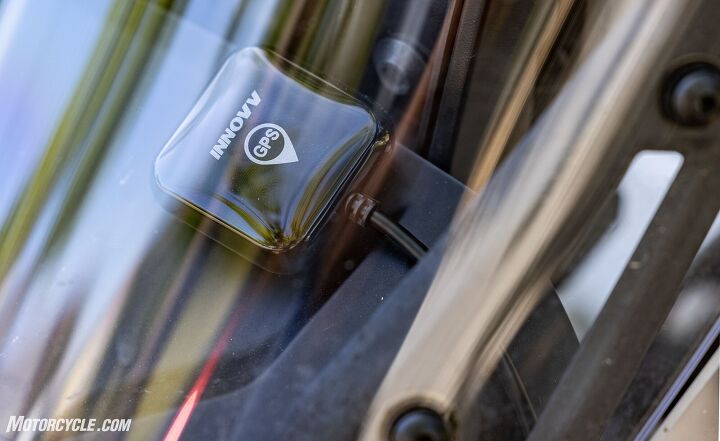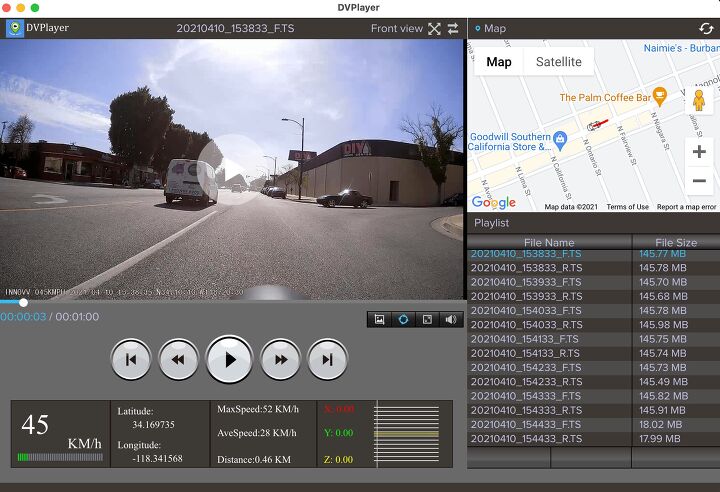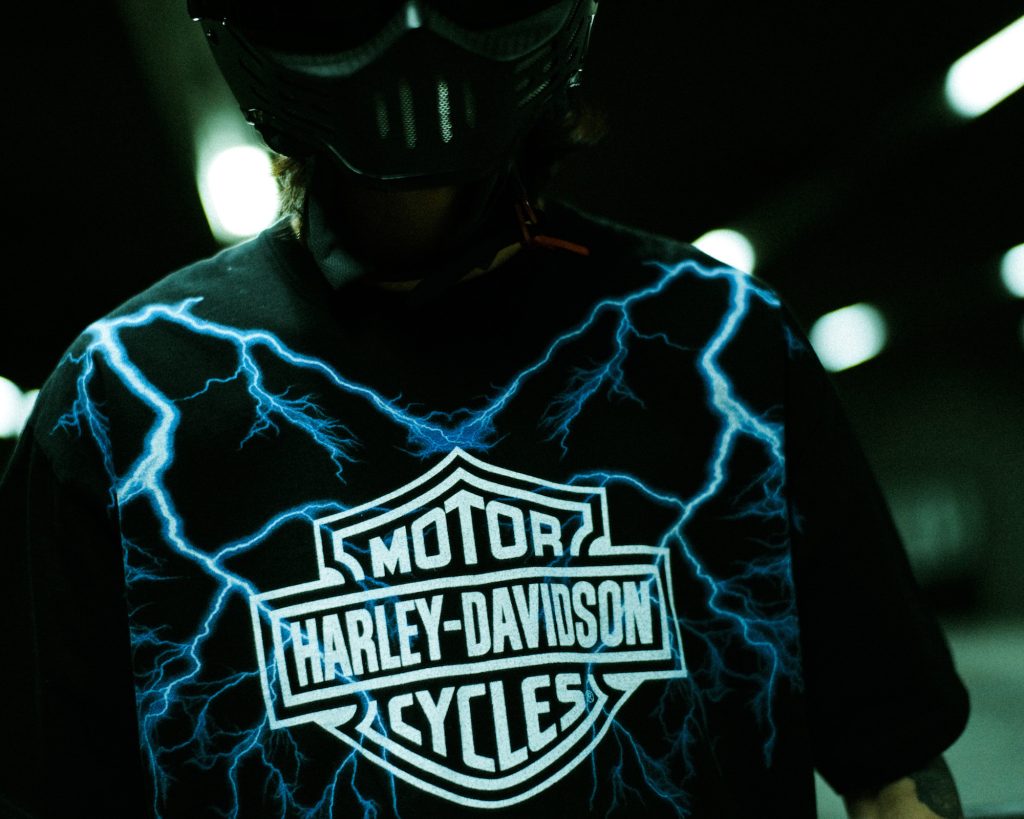Back in 2016, I reviewed the Innovv K1 dashcam and really liked it with one exception, a lack of weatherproofing. Next, we tested the Innovv K2, finding it much improved. Well, the Innovv K3 dashcam is here, and it has reached what I consider to be peak functionality as a motorcycle dashcam. Regular commuters in urban areas should consider this as an option to use to protect yourself from false claims in the case of a mishap.
MO Tested: Innovv K1 Motorcycle Camera Review
MO Tested: INNOVV K2 Motorcycle Camera System Review
What’s Changed
First and foremost, the Innovv K3 is prepared to handle any weather condition you ride in and is rated IP67 waterproof. If we decode the rating, the K3 is completely dust proof and can withstand the effects of temporary immersion up to three feet for a period of 30 minutes. So, unless you’re planning on launching your bike into a lake, you’re sure to be covered. The remote control has been upgraded to a fully metal construction and gives the rider the system status at a glance while riding. The K3 has also received a microphone for recording engine sounds or rider narration. The cable is long enough to reach the rider from many remote mounting locations for the DVR unit.
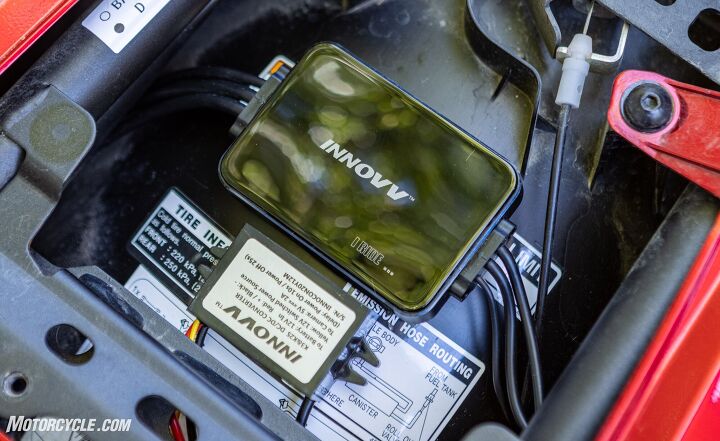
Sized at 3.1 in x 2.2 in. x 0.6 in., the K3’s DVR will easily fit on your motorcycle. You will need to tuck the excess wires out of sight, though.
Other features, which aren’t new but bear repeating, are the dual HD cameras to record front and rear views simultaneously in your choice of 1080P 30fps or 720P 60fps. The WiFi connection allows for reviewing and sharing of videos directly on a smartphone. A parking mode can record any attempts to molest your motorcycle while you aren’t there. The built-in, user-adjustable G-sensor automatically protects the current recording from erasure if the unit detects an accident. Loop recording starts recording over the oldest files first when the microSD card fills up. Still, with a maximum card size of 256GB, you can record approximately 18 hours of video before the unit overwrites old files. Finally, the control allows for the protection of key files with the push of a button, making it possible to save your favorite sections of a ride as they happen.
Installation
The relative difficulty in installing the K3 depends on the motorcycle and the space available to mount the DVR. On my test mule, a Yamaha Tenere 700, the process took about two hours, with the bulk of the time spent neatening up the wiring so that it was out of sight. Having a wiring diagram from a factory service manual makes it easier to find a switched wire to trigger the powering on of the K3.
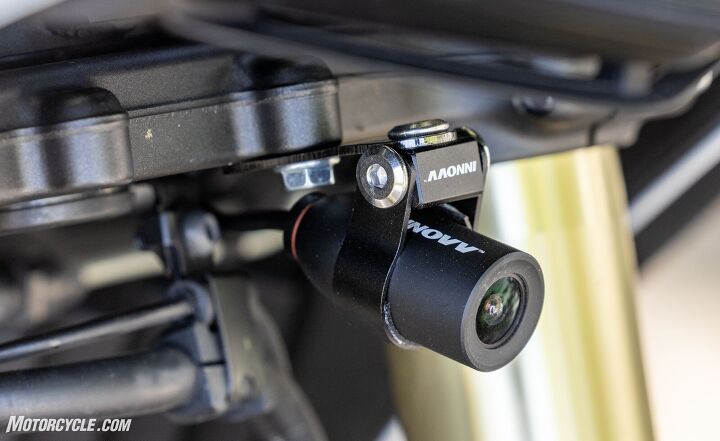
The front camera mounted conveniently on the lower triple clamp, while the rear camera (shown above) utilized a mounting plate and double-stick tape.
All of the connectors for the K3’s control switch, GPS receiver, and cameras are beefy screw-together items with o-rings for waterproofness. The cables are quite long to allow for maximum flexibility in the mounting locations on the motorcycle, but that does mean that you will have to find a place to store the excess. In this case, the Tenere had enough room under the subframe rails to hide the cables completely – as if there weren’t an extra 18-or so inches tucked away.
Mounting the cameras is as easy or as hard as the location your bike allows you to mount it. For example, the Tenere had a threaded hole on the lower triple clamp that was perfect for mounting the front camera. Although a trip to the hardware store was required to get the correct-sized bolt, the camera mounted up with one of the supplied brackets. In the rear, I used a supplied mounting plate and double-sided adhesive, which gave an extremely sturdy mount – one that was difficult to remove when the bike was returned to Yamaha. The DVR and GPS receiver were also secured to the chassis with this adhesive. The switch module mounted under a mirror stalk with the included bracket. When mounting the cameras, you do need to consider the 120° view they provide if you are mounting them anywhere other than the extreme front or rear of the motorcycle. All-in-all, the installation was quite tidy.
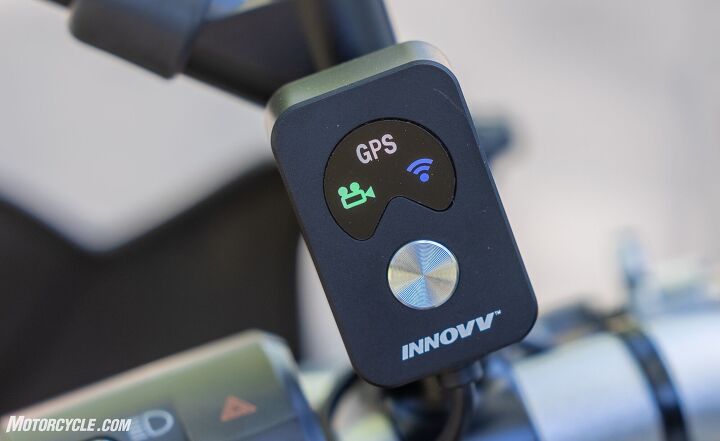
The control module mounts easily to the mirror stalk via the included bracket. LEDs indicate that the camera is running, the GPS is active, and WiFi is connected.
Daily Use
The K3 couldn’t be easier to use. It powers up when you start the bike and, depending on your settings, shuts down when the bike does. Then the K3 goes about its business every time you ride until it detects a shock or you hit the save button. Setting up the DVR to your needs is handled via a smartphone app that utilizes a WiFi connection to the K3. Most of the menus are obvious, but some are still in Chinese. I expect them to change as the firmware matures. (Updating the firmware is as easy as copying the proper file to the root level of the microSD card and following Innovv’s instructions.)
Viewing the videos can be done wirelessly, but the transfer rates are quite slow. So, when I wanted to put the videos on my computer, I removed the memory card from the DVR. Still, having the capability to view saved files on a ride is pretty fun.
When it comes time to view the files on a computer, Innovv has a DVPlayer app that is still in beta testing, which shows all of the information contained in the file, including GPS location that is shown on a map. For anything beyond this access, I still recommend the Dashcam Viewer app I mentioned in my K1 review because it has a broader feature set.
As I said in the introduction, I believe that the Innovv K3 has reached peak capability for dashcam recording. For those who are considering it for motovlogging, the K3 comes up short with its 1080P 30 FPS recording. Action cameras surpassed this long ago. The microphone is interesting and fun, but the K3 is, in its heart, a dashcam. The videos are more than adequate for sharing with friends – just don’t have any YouTube aspirations. The other limitation I noticed in the video output is the occasional jello look of the video from the motorcycle vibration interacting with the rolling electronic shutter in the cameras. Again, for dashcam purposes, this is not an issue, but for posting online, image stabilization would be nice (along with higher resolution and frame rate).
Wrap-Up
If I were a daily commuter, I wouldn’t hesitate to put the Innovv K3 on my motorcycle. It does everything I’d expect from a dashcam plus some extras (audio recording and wireless viewing/file transfer). I’d consider it $358 well spent, particularly since I was once involved in an accident where video would have proved helpful. Given the improvements in Innovv’s products in the five years I’ve been reviewing them, I wouldn’t be surprised if the company ends up releasing a unit that can compete with action cameras in terms of quality sometime in the future.
We are committed to finding, researching, and recommending the best products. We earn commissions from purchases you make using the retail links in our product reviews. Learn more about how this works.
Become a Motorcycle.com insider. Get the latest motorcycle news first by subscribing to our newsletter here.
Source link


